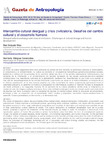
Please use this identifier to cite or link to this item:
http://ricaxcan.uaz.edu.mx/jspui/handle/20.500.11845/69Full metadata record
| DC Field | Value | Language |
|---|---|---|
| dc.contributor | 10070 | |
| dc.contributor | 102989 | |
| dc.coverage.spatial | Global | es_ES |
| dc.creator | Delgado Wise, Raúl | |
| dc.creator | Márquez Covarrubias, Humberto | |
| dc.date.accessioned | 2017-04-18T01:41:14Z | |
| dc.date.available | 2017-04-18T01:41:14Z | |
| dc.date.issued | 2012-11-07 | |
| dc.identifier | info:eu-repo/semantics/publishedVersion | |
| dc.identifier.issn | 0214-7564 | es_ES |
| dc.identifier.issn | ESSN: 2340-2792 | es_ES |
| dc.identifier.uri | http://hdl.handle.net/20.500.11845/69 | |
| dc.description | The notion of hegemonic culture has as principles of free-market values, electoral democracy, individualism, consumerism, and entertainment. Culture becomes a commercial product, galvanizing social practices, traditions, and values with the precepts of the global economy in which large multinational corporations and industries of information and entertainment constitute dumps of large contemporary cultural patterns of society. The cultural debauchery of neoliberal globalization have led to a crisis wherein substrate is beyond the breakdown of the financial circuits, as rooted in matrix of civilization: a short-circuit in the reproduction system of human life promotes a severe humanitarian crisis that takes the form of unemployment, epidemic hunger, the spread of curable diseases, forced migration, environmental degradation, and human insecurity. On the perimeter of subaltern culture, harbouring indignation as well as resistance to the hazards and risks arising from the crisis of civilization is germinating social energy, especially among young people, which draws attention to the need to promote a cultural change, where the production of knowledge, technology and art, in conjunction with critical thinking, creative and proactive, find new paths to widespread human development, the common good and real democracy. | es_ES |
| dc.description.abstract | La noción de cultura hegemónica tiene como principios los valores del libre mercado, la democracia electoral, el individualismo, el consumismo y el entretenimiento. La cultura se convierte en un espécimen mercantil que galvaniza las prácticas sociales, tradiciones y valores con los preceptos de la economía global que tiene en las grandes corporaciones multinacionales y las industrias de la información y el entretenimiento los grandes vertederos de las pautas socioculturales de la sociedad contemporánea. Los desenfrenos culturales de la globalización neoliberal han desembocado en una crisis cuyo sustrato va más allá del resquebrajamiento de los circuitos financieros, pues hunde sus raíces en la matriz civilizatoria: un cortocircuito en el sistema reproducción de la vida humana propicia una crisis humanitaria de severa proporciones que toma forma en el desempleo galopante, la epidemia de hambre, la propagación de enfermedades curables, la migración forzada, la degradación del medio ambiente y la inseguridad humana. En el perímetro de la cultura subalterna, donde anida la indignación y la resistencia ante los riesgos y peligros emanados de la crisis civilizatoria está germinando una energía social, sobre todo entre los jóvenes, que llama la atención sobre la necesidad de impulsar un cambio cultural, donde la producción de conocimiento, tecnología y arte, en conjunción con el pensamiento crítico, creativo y propositivo, encuentren nuevos senderos hacia un desarrollo humano generalizado, el bien común y la democracia real. | es_ES |
| dc.language.iso | spa | es_ES |
| dc.publisher | Universidad de Jaén. Facultad de Humanidades y Ciencias de la Educación. | es_ES |
| dc.relation | http://hdl.handle.net/10481/22980 | es_ES |
| dc.relation | http://www.gazeta-antropologia.es/?p=2585 | es_ES |
| dc.relation.ispartof | http://www.gazeta-antropologia.es | es_ES |
| dc.relation.uri | generalPublic | es_ES |
| dc.rights | Attribution-NonCommercial-ShareAlike 3.0 United States | es_ES |
| dc.rights.uri | http://creativecommons.org/licenses/by-nc-sa/3.0/us/ | * |
| dc.source | Gazeta de Antropología, ol. 28, no. 3. | es_ES |
| dc.subject.classification | CIENCIAS AGROPECUARIAS Y BIOTECNOLOGIA [6] | es_ES |
| dc.subject.other | info:eu-repo/classification/Intercambio cultural desigual | |
| dc.subject.other | info:eu-repo/classification/Violencia | |
| dc.subject.other | info:eu-repo/classification/Crisis civilizatoria | |
| dc.subject.other | info:eu-repo/classification/Cambio cultural | |
| dc.subject.other | info:eu-repo/classification/Transformación social | |
| dc.subject.other | info:eu-repo/classification/Unequal cultural exchange | |
| dc.subject.other | info:eu-repo/classification/Violence | |
| dc.subject.other | info:eu-repo/classification/Crisis of civilization | |
| dc.subject.other | info:eu-repo/classification/Culture change | |
| dc.subject.other | info:eu-repo/classification/Social transformation | |
| dc.title | Intercambio cultural desigual y crisis civilizatoria. Desafíos del cambio cultural y el desarrollo humano | es_ES |
| dc.type | info:eu-repo/semantics/article | es_ES |
| Appears in Collections: | *Documentos Académicos*-- UA Estudios del Desarrollo | |
Files in This Item:
| File | Description | Size | Format | |
|---|---|---|---|---|
| GA28-3-09-RaulDelagado-HumbertoMarquez.pdf | Versión publicada | 166,71 kB | Adobe PDF |  View/Open |
This item is licensed under a Creative Commons License
